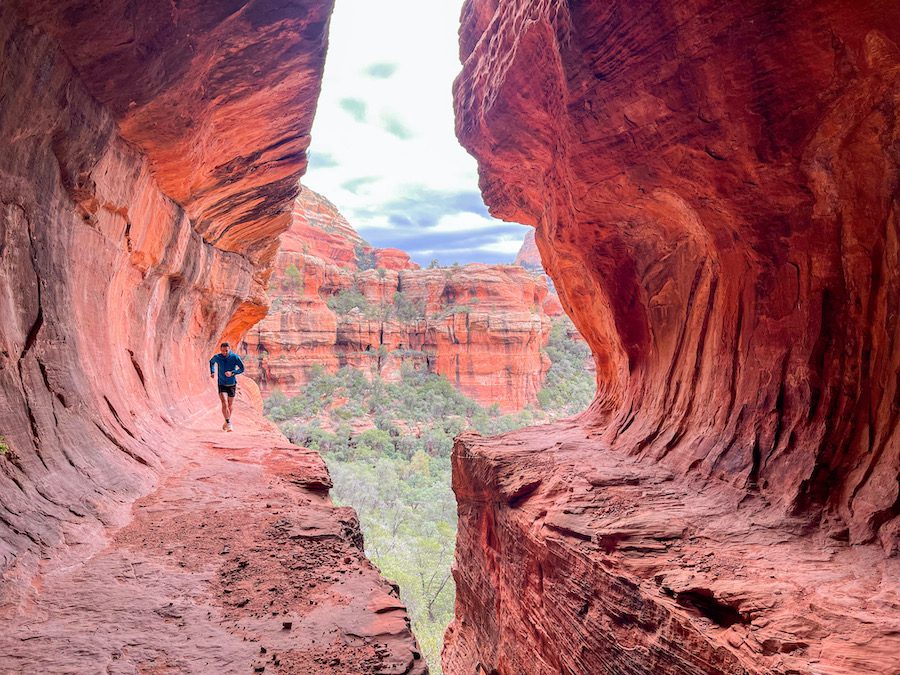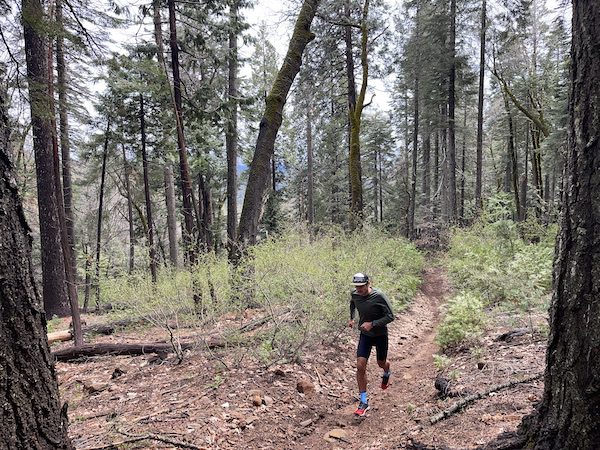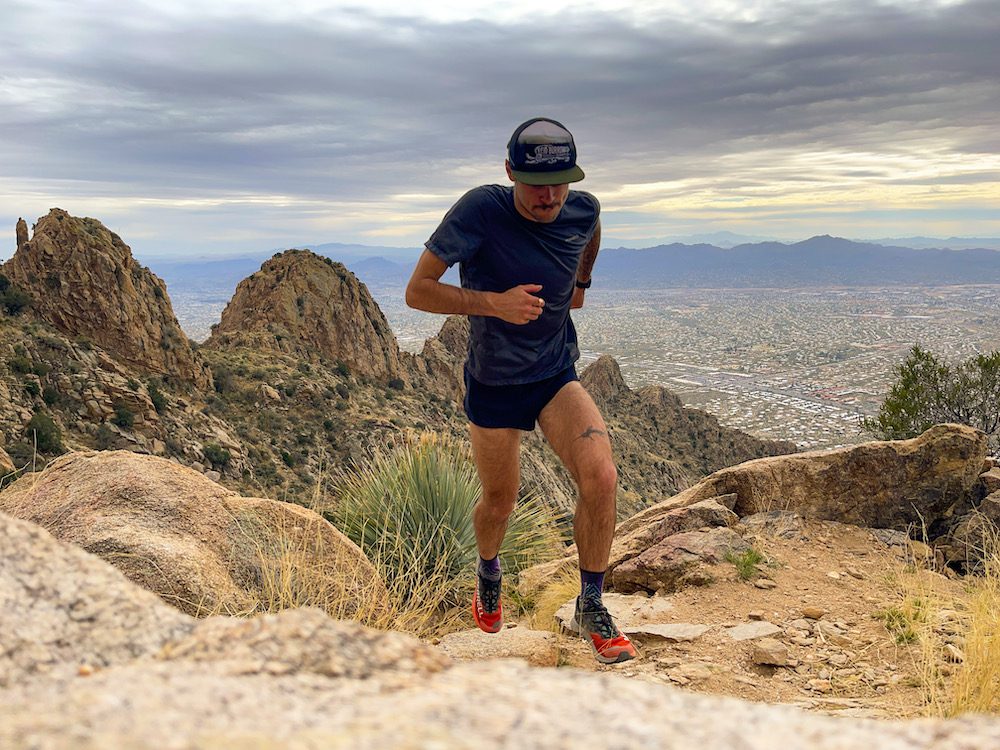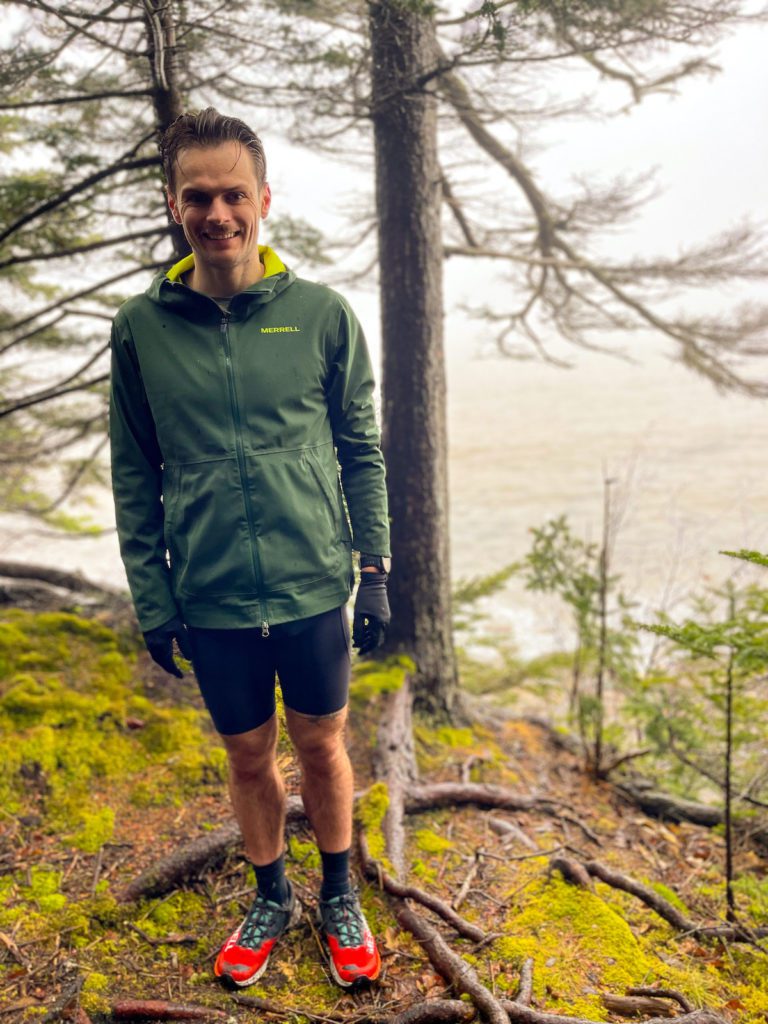Ultrarunner Reid Burrows shares his mental health odyssey
"If it weren’t for a random trail marathon a few years ago that I did on a whim, I might not be here today"
 Photo by:
Kyle Pinon
Photo by:
Kyle Pinon
It’s 4 a.m. It’s dark. The intoxicating smell of freshly ground coffee instantly makes me excited me for the ensuing adventure. The Grand Canyon was waiting for us. I came to Flagstaff with three simple goals: to think about life, to get advice from my hero and to find the will to live.
We drove to the small town of Tusayan before sunrise. I needed to see the Grand Canyon as nature intended–free of people. We made our final stop for coffee and the last toilet we’d see before making the three-hour dirt road trek into the wilderness. No cell reception. No cars. No people. My dad told me the trip was for me. I could decide what we did and when we did it.

My parents have always gone above and beyond. They cared for me like parents should. But there are two times that I will be forever indebted to them for. The first: in 2013, I was battling with my declining mental health. At the time, I was racing triathlons nationally and internationally. I moved to Hamilton to attend McMaster University. I’m originally from Grand Bay-Westfield, N.B., a town of 5,000 people. I moved to Ontario to pursue the Olympic dream. In my frosh week of university, I dislocated my shoulder. Ironically, I was sober, riding to a friend’s house on an old, rusty BMX bike, without a helmet. The chain slipped while I was standing up, and I went over the handlebars.
At the time, I was riding at least 500 kilometres a week in training on my road bike. This short trip to a friend’s house was my first introduction to a lifelong battle with my mental health. Shortly after, I stopped sleeping, became extremely ill and spent more time in doctor’s offices than I had in my entire life. My world of triathlon was stripped away from me in a matter of seconds.

I remember wondering what it would be like to take my life. I avoided friends. I would purposely make my dinner at night, dodging my housemates. Everything would make me tear up–a movie, book, a social post–and I was drinking almost every night. Anything to numb the pain. I would go for walks when I should have been sleeping. Searching for the will to live, or the strength to take my life. I felt hopeless. I didn’t have the courage to end my own life, but I didn’t feel I had the ability to continue living. I would sit on a bench in the dark and think about what the world would be like without me in it. I can still picture it, and the feeling of wanting to die, like it was yesterday.
Not wanting to live is a strange and uncomfortable feeling to describe. You have no energy. Getting out of bed becomes your Everest for the day. You don’t really want to eat, sleep or take care of yourself. You lose motivation for life’s basic needs, as well as your will to live.

One day, I built up the courage to call my mom. I told her the same story I’m telling you. She flew to Hamilton the next day. This was the first time I realized my parents loved me more than anything.
The second time was this experience with my dad, the resilient hero I admired. He knew I wasn’t doing well, and, rather than coming to Ontario to dig me out of the hole, we decided to head to Arizona for a father and son trip. We had fond memories of coming to Tucson in 2012, when I was introduced to Arizona and the sport of elite triathlon.
Neither of us foresaw the impact this trip would have. The tire ruts were two feet deep, and our rental car (not a 4×4 vehicle) could barely pass through without scraping the muffler off. I had a low-quality map on my phone that we hoped would lead us to the trailhead. After passing by an unattended tollbooth through the land of the Havasupai Tribe, we continued driving. Eventually, the road became too difficult to navigate, and we decided to park the car and run to the South Bass Trailhead. With no cell reception and my sights set on running to the Colorado River and back, we kept pressing forward, despite the small hiccup.

The five-kilometre run seemed insignificant, given how motivated I was to see the Grand Canyon for the very first time. It didn’t matter to me. This was about searching for the will to live–a more primitive feeling than any amount of adversity we faced. When we arrived at the trailhead, there was a lone truck in the parking lot that appeared to have been there for days. In one of the world’s most visited locations, we were able to experience it without distraction. There wasn’t a single sound. Even the birds seemed quiet as we looked down into the Canyon. It may have been one of the first times in my life I’ve ever heard complete silence.
I was battling with depression, or maybe something more severe. There were many diagnoses during this time, including bipolar disorder, depression and borderline personality disorder. The label didn’t matter. I was unwell, and I felt it. But for the first time in a long time, those thoughts were dormant. And then it happened–I descended into the Canyon.
There is snow in the Grand Canyon in February, at least on the first part of the descent, on the South Bass trail. I had no crampons or screws (the poor man’s crampon) to safely descend into the Canyon, but it didn’t matter. I had come so far! A few steps into my descent, I slipped, and for the first time in a really long time, I feared death.
That moment changed my life. Every struggle seemed worth it. My dad meditated in one of the seven wonders of the world, while I ran deep into the Canyon before beginning our long journey back to civilization. I can no longer imagine leaving this beautiful place we call Earth.
Life is tough. Some of the daily struggles I have today are tougher than the days that led me to the suicidal thoughts that once dominated my brain. I now understand that all thoughts are fleeting. Depression is a feeling. Anxiety will come and go. Medical support is sometimes needed, and that’s OK. I would go back to a therapist in a heartbeat if I thought I was going down a dangerous path again. I wouldn’t hesitate to take medication if I was in a rough place.
During this trip, I realized that normal life wasn’t for me, and that drew me back to Arizona, where I’m writing this story. Crazy pursuits in nature are what keep me motivated. I’m an all-or-nothing kind of person. Normalcy has never suited me. Chasing money, not goals, was what got me in the hole in the first place. I was suppressing the parts of me that made me feel alive. I now spend all of my free time doing everything I’ve ever wanted. I love chasing big goals. It makes me feel alive, and for the first time, I’m no longer suppressing those goals.
I will always choose my mental health over everything. Nature and running saved my life. If it weren’t for a random trail marathon a few years ago that I did on a whim, I might not be here today. I’m thankful for everything I’ve ever gone through. It has shaped me into the man I am today. I’m not going anywhere unless it’s on two feet.
Reid Burrows is a freelance writer, ultramarathon runner and mental health advocate. On April 23, he finished the Canyons 100K in 25th place overall in 10:51:53. You can follow his journey at instagram.com/reidburrows.


